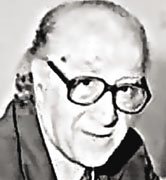
FACES & TRACESJabra Ibrahim Jabra, a multitalented and perceptive Palestinian figure [Archives:2007/1112/Culture]
December 17 2007
 |
Faces & Traces is a cultural series of concise biographies of local or international famous and obscure personalities in fields such as literature, arts, culture and religion in which these individuals contribute affirmatively. It is a short journey in contemporary history, attempting to tackle numerous effective characters in human civilization.
Jabra Ibrahim Jabra was a Palestinian novelist, poet, short story writer, translator, critic, scenarist (a screenplay writer) and painter.
Born in Bethlehem in 1920 of Syriac Orthodox origins, Jabra commenced his elementary education at a Syriac school, followed by Bethlehem's National School in 1929 before going to Jerusalem, where he studied at Al-Rashidiya High School in 1932. He then attended Jerusalem's Arabic College, becoming well-versed in English, Arabic and Syriac languages.
Jabra received a scholarship to study in Great Britain at Cambridge University's Exeter College, graduating in the mid-1940s with a master's degree in English literature. After graduation, he returned to Palestine, where he was appointed a lecturer at Jerusalem's Al-Rashidiya College and taught art at his alma mater, Al-Rashidiya Secondary School].
Following the occupation of Palestine in 1948, Jabra was forced to flee his destroyed homeland, settling in Baghdad and joining the British archeology mission. He later taught English literature at Baghdad University before being awarded a fellowship to Harvard University in the United States in 1952.
Returning to Baghdad in 1954, Jabra joined Iraq's National Oil Company, in addition to working on several documentary films. During the 1950s, he also founded the Baghdad Contemporary Art Group, as well as being editor-in-chief of Arabic Art magazine and president of Iraq's Art Critics Association.
He continued lecturing at Baghdad University's Faculty of Arts and at Queen Aliyah College until 1964.
Jabra produced approximately 60 books, including novels, poetic divans and translated material, among other artistic and literary works, some of which have been translated into more than 12 languages.
He won numerous Arab and international literary prizes and medals, including the 1983 Culture Art Prize awarded by the Interart Forum in Rome, the 1989 Saddam Hussein Prize for Fiction, the Emirates' Sultan Al-Owais Prize for Literary Criticism and the 1990 Jerusalem Medal for Literary Achievement.
In 1956, Jabra published a short story collection entitled, “Iraq and Other Stories,” whereas most of his novels tackled the peculiar Palestinian personality in exile and the relationship between the protagonists and their motherland.
His first novel, “Passage in the Silent Night,” was written in English in 1946 and translated into Arabic in 1955. Also written in English, 1960's “Hunters in a Narrow Street” portrayed the myriad conflicts between Arabs and Jews, dictatorship vs. futile liberal efforts and Eastern tradition vs. Western innovation.
His novel “Al-Safinah” (“The Ship,” 1970) is a masterful exploration of the post-1948 Arab world, with its frustrated yearnings for homeland and the struggle for survival, while his masterpiece, “In Search of Walid Masoud” (1978), explores the Arab intellectual's response to the chaos in the Middle East during the postcolonial era.
Jabra coauthored the 1982 novel, “A World Without Maps,” with renowned Saudi author Abdulrahman Munif. Another of his novels, “The Other Rooms” (1986), is the story of a well-informed character who attempts to change his personality to coexist with a world in which he originally is uninterested.
Jabra's last novel was 1991's “The Journals of Sarab Affan,” which was set during the first intifada and was a hallmark in contemporary Arab literature. The work is affirmative yet unsettling in its theme of salvation in the face of inescapable loss, alienation and exile.
In the field of literary translation, Jabra is considered one of the best translators of literary works by great authors. He translated Samuel Beckett's play, “Waiting for Godot,” and William Faulkner's novel, “The Sound and the Fury.” Additionally, he translated two of Oscar Wilde's most famous children's works, including “The Happy Prince,” as well as a story collection by French writer Jean de La Fontaine.
However, Jabra's most massive contribution was translating Shakespearean works such as “Hamlet,” “King Lear,” “Macbeth,” “The Tempest” and “Twelfth Night.” He translated into Arabic exclusive studies and bibliographical works on these tragedies, including Jan Kott's “Shakespeare Our Contemporary” and John Dover Wilson's “What Happens in Hamlet.”
As a literary critic, Jabra authored numerous books tackling literary critique, including “Freedom and Flood” (1960), “The Eighth Journey” (1967), “The Vision's Springs” (1979) and “Glorifying the Life” (1989).
Jabra's poetic collections include four divans: “Tammuz in the City” (1959), “The Closed Circuit” (1964), “The Sun's Anguish” (1979) and his last divan, “Seven Poems” (1989).
Having painted since childhood, Jabra founded the Jerusalem Art Club during the 1940s. In Iraq, he participated in fine arts exhibitions and closely associated with Baghdad's new and powerful art movement in. He penned several artistic critical books, including “Art in Iraq Today” (1961) and “The Grassroots of Iraqi Art” (1983).
As a fictional scenarist, Jabra authored two books entitled, “The Sun King” (1986) and “Days of the Eagle: Khalid and Al-Yarmouk Battle” (1988).
Jabra also penned his autobiography in two volumes, the second of which was entitled “Princesses' Street: Baghdad Memories” (1994), which continued his story begun in 1987's “The First Well: A Bethlehem Boyhood.”
An exceptional 20th century icon in Arab literature, Jabra died in Iraq at age 74 on Dec. 11, 1994, leaving a literary heritage that will remain a brilliant representation in contemporary Arabic cultural history.
——
[archive-e:1112-v:15-y:2007-d:2007-12-17-p:culture]


